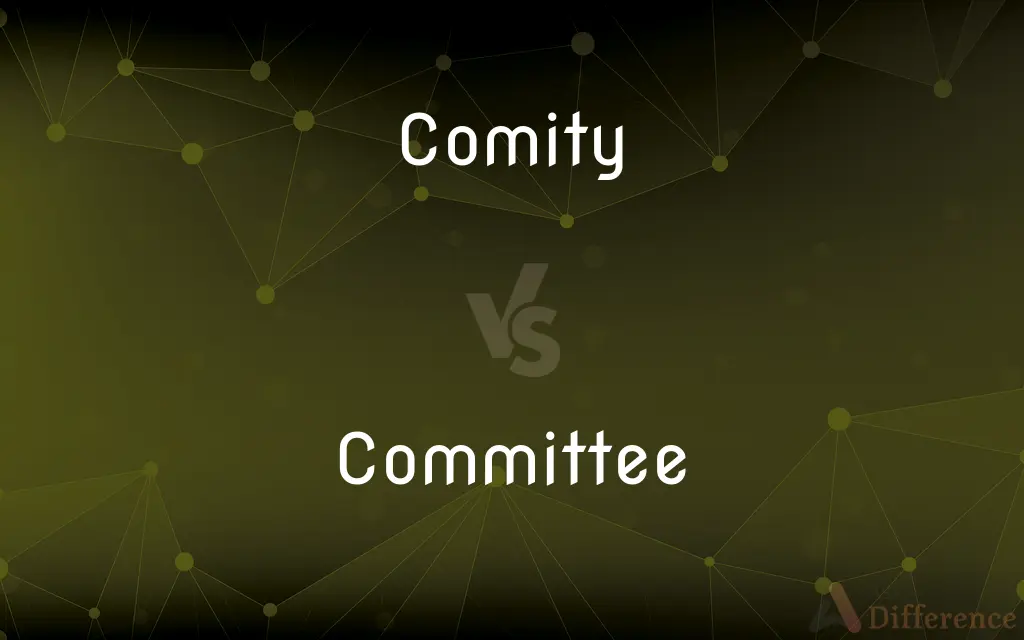Comity vs. Committee — What's the Difference?
By Tayyaba Rehman & Maham Liaqat — Updated on March 14, 2024
Comity refers to a social harmony and respectful behavior among individuals or nations, while a committee is a group of people appointed for a specific function, typically within a larger organization.

Difference Between Comity and Committee
Table of Contents
ADVERTISEMENT
Key Differences
Comity embodies the idea of courtesy and mutual respect among individuals or nations, fostering a peaceful and cooperative relationship. In contrast, a committee is formed with the purpose of deliberating on specific issues or managing tasks within a defined scope, emphasizing structure and function over social harmony.
While comity plays a crucial role in diplomatic relations and the smooth interaction between sovereign states, committees are pivotal in organizational contexts, making decisions or recommendations based on collective expertise. Comity facilitates understanding and respect, whereas committees focus on achieving objectives and outcomes.
The concept of comity suggests an informal, voluntary practice of recognizing and respecting the laws and judicial decisions of another, without necessarily being bound by them. On the other hand, a committee operates under formal rules and guidelines, often established by the larger body that appointed it, to ensure its actions align with organizational goals.
Comity, by promoting a spirit of cooperation, can lead to more effective and harmonious international relationships and societal interactions. Committees, through structured deliberation and action, aim to efficiently address specific tasks or problems within their purview, contributing to the overall objectives of the larger organization.
The effectiveness of comity relies on the goodwill and mutual respect of the parties involved, without formal enforcement mechanisms. Conversely, committees are typically bound by organizational rules and have defined roles, responsibilities, and powers to enact decisions or recommendations.
ADVERTISEMENT
Comparison Chart
Definition
Courtesy and respect among individuals or nations
A group appointed to perform a specific task
Scope
Social harmony, diplomatic relations
Specific organizational functions
Basis
Informal, voluntary respect
Formal appointment and guidelines
Role
Facilitates understanding and cooperation
Deliberates and manages tasks
Enforcement
Based on goodwill, no formal power
Has defined powers within an organization
Compare with Definitions
Comity
The practice of courtesy and respectful behavior in society or among nations.
International comity is essential for maintaining peaceful global relations.
Committee
A group of people designated to perform a specific function within an organization.
The committee on ethics reviews all research proposals.
Comity
Voluntary adherence to courteous behavior without legal obligation.
Comity among competing firms can lead to fair business practices.
Committee
An assembly of experts brought together to address specific issues.
The committee consists of leaders from various departments.
Comity
Respect for another's sovereignty and laws.
Diplomats work hard to uphold comity in their international dealings.
Committee
A body appointed to investigate, report on, or act on a particular matter.
The city council established a committee to explore housing solutions.
Comity
The social harmony and cooperative spirit in a community.
The neighborhood's comity was evident in its inclusive celebrations.
Committee
A subgroup of a larger organization tasked with specific duties.
She served on the committee responsible for planning the annual conference.
Comity
A mutual recognition, especially among nations, of laws and judicial decisions.
The principle of comity underpins many international agreements.
Committee
Members collectively tasked with a decision-making or advisory role.
The selection committee interviewed all the candidates.
Comity
In law, comity is "a practice among different political entities (as countries, states, or courts of different jurisdictions)" involving the "mutual recognition of legislative, executive, and judicial acts."
Committee
A committee or commission is a body of one or more persons subordinate to an assembly. A committee is not itself considered to be a form of assembly.
Comity
An atmosphere of social harmony.
Committee
A group of people appointed for a specific function by a larger group and typically consisting of members of that group
A committee meeting
The housing committee
Comity
See comity of nations.
Committee
A person entrusted with the charge of another person or another person's property.
Comity
(Law) The principle by which a court in one jurisdiction defers to a court in another jurisdiction where either would have legal power to decide the case, or gives effect to the laws, executive acts, or legal decisions of another jurisdiction.
Committee
A group of people officially delegated to perform a function, such as investigating, considering, reporting, or acting on a matter. See Usage Note at collective noun.
Comity
And considerate behaviour towards others; social harmony.
Committee
(Archaic) A person to whom a trust or charge is committed.
Comity
Friendly understanding and mutual recognition between two entities, especially nations.
Committee
A body of one or more persons convened for the accomplishment of some specific purpose, typically with formal protocols.
Comity
Mildness and suavity of manners; courtesy between equals; friendly civility; as, comity of manners; the comity of States.
Committee
(archaic) A guardian; someone in charge of another person deemed to be unable to look after themself.
Comity
A state or atmosphere of harmony or mutual civility and respect
Committee
One or more persons elected or appointed, to whom any matter or business is referred, either by a legislative body, or by a court, or by any collective body of men acting together.
Committee
One to whom the charge of the person or estate of another, as of a lunatic, is committed by suitable authority; a guardian.
Committee
A special group delegated to consider some matter;
A committee is a group that keeps minutes and loses hours
Committee
A self-constituted organization to promote something
Common Curiosities
What is the purpose of comity in international relations?
To ensure courteous and peaceful interactions among nations through mutual respect and understanding.
What are the typical responsibilities of a committee?
Investigating matters, reporting findings, making decisions, and executing tasks relevant to their specific mandate.
Can comity exist without formal agreements?
Yes, comity is based on voluntary and informal respect, not necessarily formal legal agreements.
How does comity benefit global diplomacy?
It facilitates smoother diplomatic interactions and cooperation, respecting each nation's sovereignty and legal system.
Who can form a committee?
Any organization or institution needing a structured group to address specific tasks or issues.
What is the difference between a committee and a working group?
A committee is a more formal and permanent entity, while a working group is often temporary and focused on a specific project.
What makes a committee effective?
Clear objectives, defined roles, diverse expertise among members, and adherence to organizational guidelines.
Can a lack of comity lead to conflict?
Yes, without mutual respect and understanding, relationships between individuals or nations can deteriorate, potentially leading to conflict.
How does a committee function within an organization?
By deliberating on specific issues, making decisions, or providing recommendations based on collective expertise.
Can comity lead to formal agreements?
While comity itself is informal, it can foster an environment conducive to forming formal agreements.
Is comity legally binding?
No, comity is based on goodwill and voluntary practices rather than legal obligations.
What are examples of comity in action?
Diplomatic immunity and the peaceful resolution of international disputes are examples of comity.
How are committee members chosen?
Members are usually appointed based on their expertise, interest, or position within the larger organization.
How do committees impact decision-making in organizations?
They streamline decision-making by focusing expertise and authority on particular areas, improving efficiency and outcomes.
Share Your Discovery

Previous Comparison
Cylindrical vs. Tube
Next Comparison
Undisrupted vs. UninterruptedAuthor Spotlight
Written by
Tayyaba RehmanTayyaba Rehman is a distinguished writer, currently serving as a primary contributor to askdifference.com. As a researcher in semantics and etymology, Tayyaba's passion for the complexity of languages and their distinctions has found a perfect home on the platform. Tayyaba delves into the intricacies of language, distinguishing between commonly confused words and phrases, thereby providing clarity for readers worldwide.
Co-written by
Maham Liaqat













































